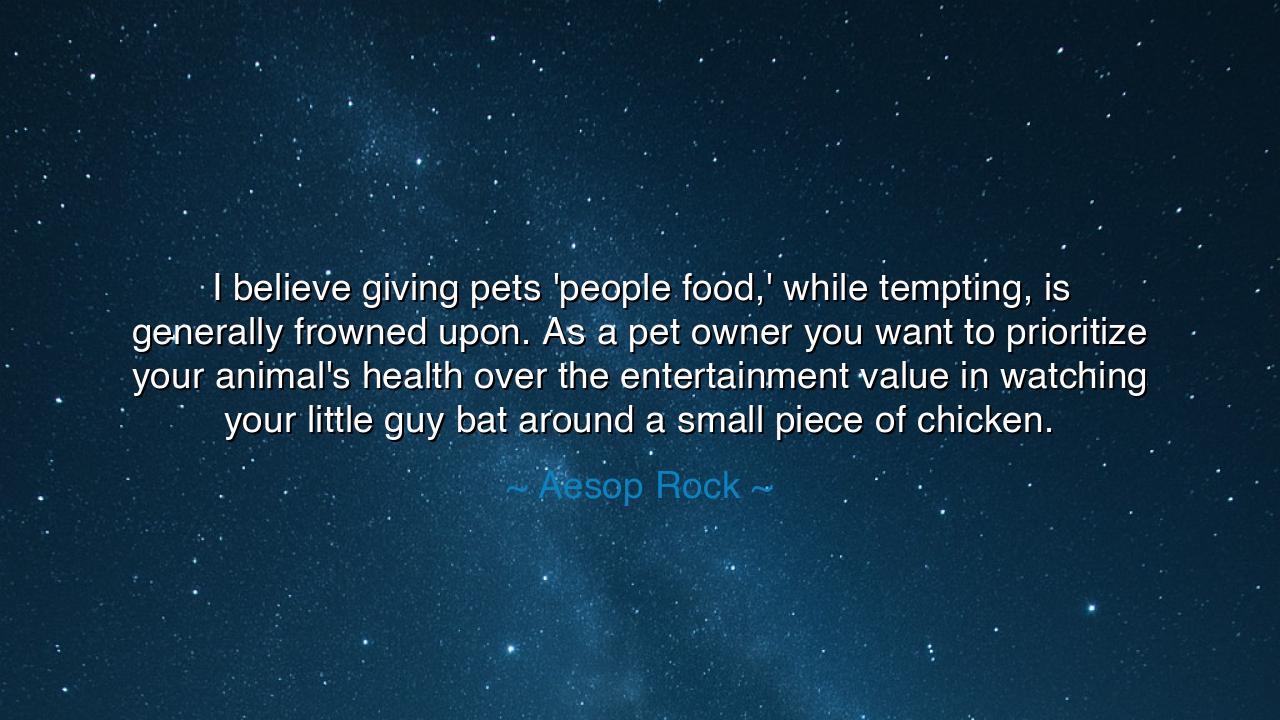
I believe giving pets 'people food,' while tempting, is
I believe giving pets 'people food,' while tempting, is generally frowned upon. As a pet owner you want to prioritize your animal's health over the entertainment value in watching your little guy bat around a small piece of chicken.






Hear, O keepers of creatures and guardians of the hearth, the words of Aesop Rock, who spoke with both humor and gravity: “I believe giving pets ‘people food,‘ while tempting, is generally frowned upon. As a pet owner you want to prioritize your animal’s health over the entertainment value in watching your little guy bat around a small piece of chicken.” Though simple in its form, this saying carries deep wisdom: that love is not measured by indulgence, but by care, and that true stewardship demands discipline, even when the heart delights in play.
To place people food before an animal is tempting, for it entertains us to see their joy, their eager eyes, their playful paws. Yet what brings us amusement may bring them harm. The health of the creature must weigh heavier than the fleeting laughter of its master. In these words, Aesop Rock reminds us that true affection is not selfish but selfless, not rooted in our own pleasure, but in the well-being of the one we care for.
To be a pet owner is to take upon oneself a sacred trust. These creatures are bound to us not by choice but by circumstance. They cannot decide what to eat, how to live, or when to seek healing. All rests upon the shoulders of their guardian. And so, the giving of food becomes a symbol of this responsibility: do we give what delights us, or do we give what strengthens them? Thus the small act of resisting indulgence becomes a larger act of honor and devotion.
Consider, O listener, the tale of the farmer and his oxen in ancient China. A careless farmer, eager to reward his ox after a day’s toil, fed it rich grains and treats meant for men. The ox, unaccustomed to such fare, grew sick and weakened, unable to plow the fields. The farmer’s delight in generosity became his own sorrow, for both he and the ox suffered loss. His neighbor, wiser in his ways, fed his animals steadily and properly, and so they thrived together. The lesson is the same as Aesop Rock’s: misplaced kindness can be cruelty, while measured care is the truest love.
The meaning of this saying is clear: affection that ignores the true needs of another is not affection at all, but disguised selfishness. To love an animal—or any being—is to set aside our own amusement for the sake of their well-being. The entertainment value may be fleeting, but the health of the one entrusted to us must endure. This is a teaching that extends beyond pets, into all relationships where care and responsibility are demanded.
The lesson for you, O child of tomorrow, is this: in every bond, choose the good of the other over your own fleeting delight. Whether with animals, friends, or kin, let your love be measured not by how much joy it brings you, but by how much life, strength, and peace it brings them. This is the foundation of true loyalty and lasting trust.
Practical action follows: feed your pets wisely, with patience and restraint. Do not indulge them in what harms, no matter how their eyes plead or how your heart softens. Instead, give them the steady gifts of nourishment, exercise, safety, and affection. Extend this same principle to your human ties—resist the temptation to choose the easy pleasure when the harder path leads to greater good. In so doing, your care will be a source of life, not harm.
Therefore, remember the wisdom in Aesop Rock’s playful yet profound words: true love requires restraint, discipline, and sacrifice. To guard the health of those entrusted to you, even at the cost of your own amusement, is the mark of a noble spirit. For in choosing their good above your fleeting joy, you honor not only them, but also the greater law of love itself.






AAdministratorAdministrator
Welcome, honored guests. Please leave a comment, we will respond soon